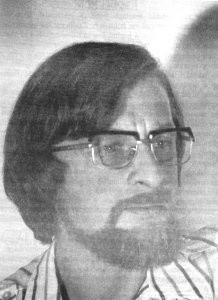Hi everyone 🙂
I’m back to blogging after this somewhat lengthy weekend, and I’m ready to share my thoughts, art, and experience with you 🙂
First and foremost, I’d like to answer briefly to this prompt.
My favorite thing about myself is that I always think with my own head and I’m not easily swayed by the opinions of other people. Additionally, I’m curious, inquisitive, experimental, and I’m constantly trying to broaden my horizons, which leads me to the fact that I’m a passionate reader 😉 And I love this about myself very much.

Speaking of which, this weekend I finished reading The Whole Truth about the Planet Ksi, written by Janusz Zajdel, a prominent Polish sci-fi and dystopian writer. Recently, I’ve written about his short story collection The Farewell Letter. For those who may not know, let me briefly remind you, that this author was a important figure among Polish sci-fi writers, helped and cared about younger writers a lot.
Having worked in radiology safety and as a university professor, he tried to combine or even balance the fictional part of science fiction with scientific facts and rational logic. Zajdel‘s dystopian works reflected his criticism of the Polish socialistic reality of his life, and also the way any propaganda fogs people’s minds. He died of lung cancer at the considerably young age of 46.
Speaking of The Whole Truth About the Planet Ksi, it is mostly a dystopian novel with some sci-fi elements (transplanetary travel and colonization of other planets than Earth). It revolves around the ideas of how totalitarian societies are created and why they thrive even if people suffer. Lies are a better basis for creating such societies because lies are flexible, and truths are often stiff and inconvenient. If you provide people with some outside enemy, the people will be connected, trusting, and praising the tyrants as their only protectors.
The story unfolds through two perspectives: one is an expedition head, Sloth, who was sent to check what was going on with the group of colonists sent to planet Ksi, and the second perspective is that of the original colonization group’s captain, whom we know as 11, or great grandfather.
Sloth is neutral, rational, and quite mature. He values the years that are left to him, remembers totalitarian societies on Earth, and does not rush into decisions or quick actions. He prefers the marveled eyes of women to any political power, giving us the impression that we can trust him.
On the contrary, 11 has lots of dishonest desires and unhealthy ambitions, betrayed his friends, enemies, and people of this globe several times, and actually helped terrorists establish this totalitarian, even feudal, society, where your rank is based on the number tattooed on your forehead. This makes readers doubt his perspective on things; still, he was the one who saw everything from the very beginning.
The author of the book does not force an opinion on you; you may choose what to think of the main character and even of the future destiny of the planet Ksi. When the second expedition arrives to spy on the Ksi’s society, they also are not sure of their next course of action regarding this society. They want to help, but they are unsure of how to do it without turning out as alien conquerors who took away the last straw of hope from this planet’s population.
And I really appreciate this approach, this conversational, theorizing way which lets us, readers, decide for ourselves. The language is descriptive, the protagonists are multi-dimensional, and their emotions are genuine. Readers can empathize with their doubts, turmoil, and longings
The society, though a bit caricatured, actually reminds us of the ones we have on Earth, and the author precisely demonstrates how they function. Yes, something like this, theoretically speaking, may have appeared in space at the early stages of colonizing. Well, such states are and were here, near us on Earth.
However, I had uncertainties while reading the book. For instance, how did people age in space in this book? I thought that outside Earth’s gravity we remain unaffected by the flow of time (perhaps someone with a physics background can explain this to me). Another moment: planet Ksi had only a 16-hour-long day, I get it. However, human biological hours should still remain 24… Am I right?
Additionally, the first generation of colonists was deprived of technology, which is understandable, but couldn’t they hunt with some handmade primitive tools? I believe J. Zajdel had explanations for that, but unfortunately, it is unlikely I will ever ask him…
Overall, I took great pleasure in reading this compelling dystopian novel. It broadens your perspective and encourages you to think, speculate, come up with your own choices and solutions. And prompts us to analyze the roots of various social issues and the ways many modern totalitarian societies function and continue to develop.
The Whole Truth about the Planet Ksi reminds me a bit of Eden by S. Lem, so if you are a fan of those authors or you really enjoy reading dystopian prose, it may be a great pick for you😊
Thank you for reading this and I hope I’ve answered this prompt!
© MarvellousNightmare on Coconut Doesn’t Exist
If you are interested in my readings and sessions (see the examples here), please take a look at my offer 🙂



